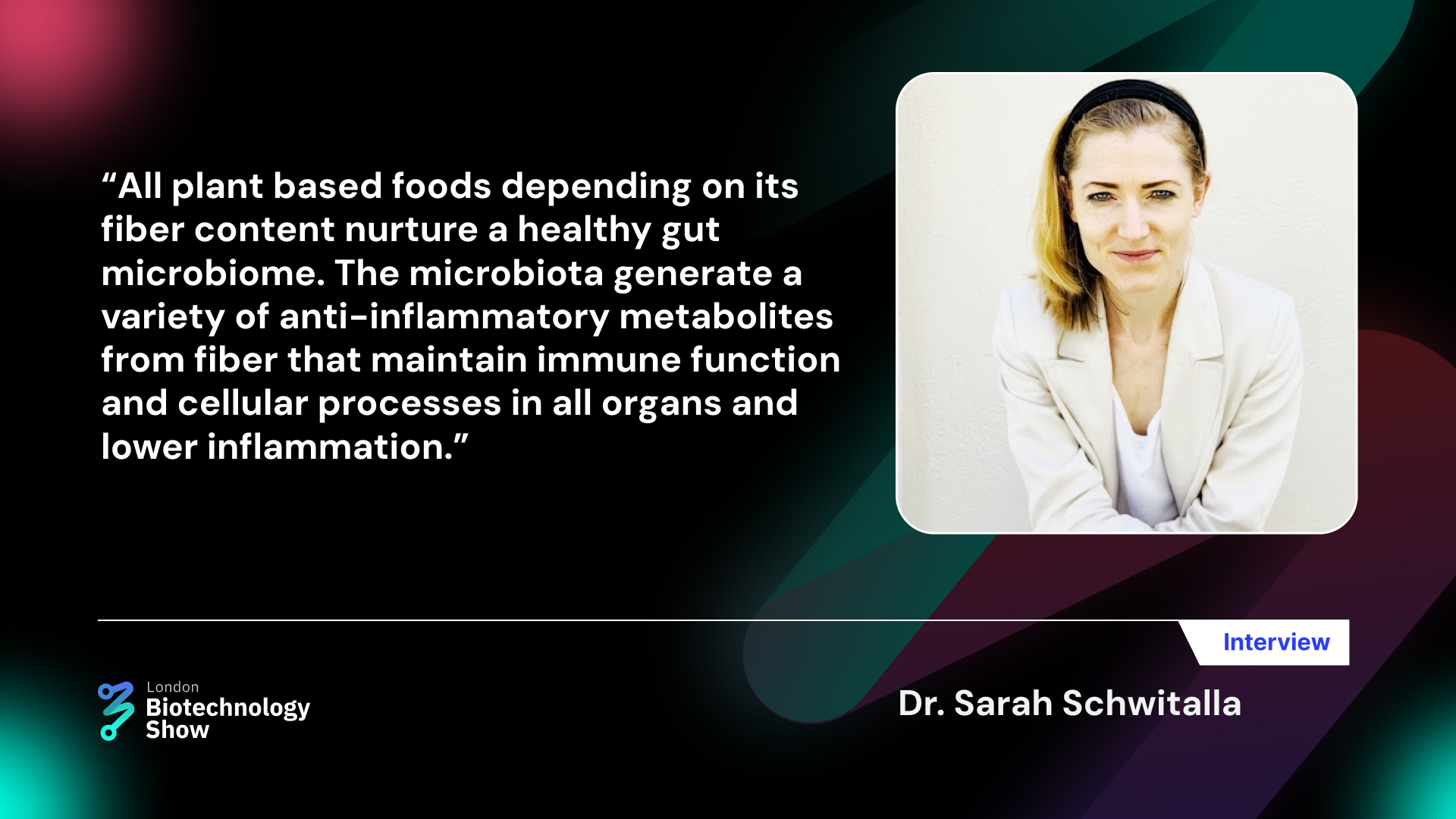Adjusting one's diet holds significant promise in fostering healing, amplifying general wellness, and prolonging life. Exploring this fascinating link and the particular dietary choices that wield substantial influence, Muhammad Younis delved into an extensive conversation with Dr Sarah Schwitalla. A molecular medicine and biochemistry Ph.D., she boasts a background as a former Harvard scientist, entrepreneur, scientific writer, author of three books, speaker, and medical advisor.
#LBS: How can specific dietary interventions serve as a form of medicine in promoting healing, enhancing overall well-being, and potentially extending longevity?
Dr Sarah: Subclinical chronic inflammation and microbiome disturbances are hallmarks of accelerated aging. Aging literally means "Inflamm-aging". It increases the risk of chronic disease and early death. The key to combating the inflammation is increasing the consumption of anti-inflammatory foods: plants. A plant based whole foods diet is rich in dietary fiber and antioxidants which are key phytonutrients that are shown to counteract inflammation and slow down cellular aging by supporting a healthy microbiome, strengthen the gut barrier and combat mitochondrial oxidative stress in our human cells. That is probably the reason why the largest and longest-running cohort studies on earth consistently demonstrate that eating more whole plant foods —fruits, vegetables, whole grains, beans, and nuts— lowers inflammation by 40%, the risk of heart disease by 25% and risk of dying earlier by more than 20%.
#LBS: Which foods exert the most significant impact, positively or negatively, on our microbiome's health, influencing our capacity to prevent and reverse diseases?
Dr Sarah: All plant based foods depending on its fiber content nurture a healthy gut microbiome. The microbiota generate a variety of anti-inflammatory metabolites from fiber that maintain immune function and cellular processes in all organs and lower inflammation. Foods with the most significant beneficial effects on microbiome, gut health and disease risk are whole grains such as oats, barley, rye etc, walnuts, berries, plums, dark leafy greens, beans and lentil, soy or broccoli,….just to name a few. A recent cohort study identified that long- term diets enriched in legumes, vegetables, fruits and nuts and a generally higher intake of plant over animal foods was linked to an anti-inflammatory microbiome and lower inflammation. In contrast, a higher intake of animal foods, processed foods, alcohol, sugar, soft drinks, sweeteners and saturated fats corresponded to an inflammatory microbial environment and more inflammation in the body.
#LBS: Are there identifiable dietary patterns or superfoods that have shown consistent evidence in not only healing ailments but also promoting longevity and robust health?
Dr Sarah: Global cohort studies and large diet intervention trials all show the same diet pattern: the more plant based the diet the less inflammation, cellular aging and disease occurs. There seems to be no black and white, but simply: the more plant foods the greater the health effect. For example, just eating 5 servings of fruit and veggies daily increases lifespan by 5 years, while 1 hot dog a day shortens life span by 2 years. Adding a handful of nuts (30 g) in your diet slows down biological aging by 2 years. The effect is even enhanced when choosing the most polyphenol-rich plant foods. For example, a recent large randomized controlled study showed that people who ate a “green” mediterranean diet for 1.5 years, that contains an increased amount of polyphenol rich foods (colorful plant foods), walnuts, Mankai (a sea plant), green tea, and very little meat and alcohol compared even to a standard Mediterranean diet or a generally healthy diet according to food guidelines slowed down biological aging by 9 months. The most important aspect though is food variety and quality rather than highlighting specific foods. We don't eat just one food. We eat many different foods in combinations that vary from day to day; the variation in our food intake provides the nutritional needs.
#LBS: What does the process entail for cultivating a flourishing gut microbiome through dietary decisions, and what's the typical timeline for restoring its health?
Dr Sarah: The process involves 2 critical steps: 1. Reduce the amount of potential harmful foods (ultra processed foods with artificial ingredients and lots of meat e.g.) 2. Gradually increase the amount of fiber rich foods Diet intervention studies with increased vs. low fiber food diets show that the microbiome metabolism can adapt very quickly, initial changes appear already within 48 hours, however for robust, permanent results that also restore gut health remarkably a longer period of time is required. It depends on the individual microbiome behavior, studies see significant results somewhat between 6 weeks to 12 months.
#LBS: How does the microbiome evolve with age, and what adjustments in dietary preferences should we consider as we traverse different stages of life to maintain its harmony and functionality?
Dr Sarah: The baby's microbiome maturation occurs from birth to the age of 3 and is depending on many different factors such as birth mode and breastfeeding. After weaning and when solid foods are introduced to the baby's diet it settles into a stable structure resembling that of a robust adult's microbiota. From this point onwards, diet becomes a major factor influencing the gut microbiota throughout life. In aging individuals, there's often a reduction in microbiome diversity and metabolic changes, considered a hallmark of aging. However, it remains unclear whether these changes are a cause or consequence of senescence, as they coincide with alterations in food and calorie intake. 5 things support the Microbiome throughout life: breastfeeding as long as possible, applying antibiotics only when necessary, a daily variety of plant based whole foods inherently fiber-rich, diet low in added sugar, saturated fat and meat, ensure meeting calorie and nutrient requirements for respective age groups.
#LBS: London Biotechnology Show aims to explore biotech solutions to be incorporated in healthcare for a better and robust future? How do you view events like these?
Dr Sarah: Events like these are Hubs for innovative minds and breeding grounds for new partnerships. This can be a breakthrough accelerator for sustainable and innovative solutions.

